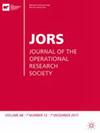决策中直接反应法与策略法的差异:奖罚博弈中的行为与神经证据
IF 2.7
4区 管理学
Q2 MANAGEMENT
引用次数: 0
摘要
摘要决策者可以采用直接反应法或策略法。虽然这两种启发方法在理论上是等效的,但在实践中它们是否会导致相同的结果是不确定的。为了探讨这一问题,我们在两种方法下进行了基于奖惩游戏的实验,其中使用功能磁共振成像(fMRI)为揭示潜在的行为机制提供神经证据。结果表明,策略法的奖惩率均显著高于直接反应法。我们开发了行为模型来解释这些差异,并确定所有权效应、战略思维和反事实思维是潜在的驱动因素。两种处理的神经活动比较表明,在奖励/无奖励决策过程中,直接反应处理在双侧前叶产生更强的激活,表明决策者由于所有权效应而过度考虑奖励成本,从而导致施加奖励的意愿降低。相反,在惩罚/不惩罚决策过程中,策略处理导致双侧前叶和顶叶下小叶的激活更强,这意味着决策者由于反事实思维而感知到强烈的不公平,从而导致更多的惩罚决策。此外,我们的研究结果表明,战略思维在长期互动中影响决策。关键词:行为启蒙方法惩罚博弈核磁共振反事实思维伙伴效应致谢感谢清华大学生物医学成像研究中心的技术支持。披露声明作者未报告潜在的利益冲突。注1没有使用统计程序来预先确定样本量,但我们的一个治疗的样本量并不小于先前出版物中类似的fMRI实验(greucci et al., Citation2013;Sanfey et al., Citation2003;赵等,Citation2016)我们分别对发送者和接收者在直接反应和策略处理中的决策进行了回归分析。时间趋势系数在p = 0.05水平下不显著。本研究由国家自然科学基金资助,资助项目:72271136。本文章由计算机程序翻译,如有差异,请以英文原文为准。
On difference between direct-response method and strategy method in decision-making: behavioural and neural evidence in a reward-punishment game
AbstractDecision-makers may follow either the direct-response method or strategy method. While the two elicitation methods are theoretically equivalent, it is uncertain whether they lead to the same outcomes in practice. To explore this issue, we conduct an experiment based on a reward-punishment game under both methods, in which functional magnetic resonance imaging (fMRI) is used to provide neural evidence for uncovering the underlying behavioural mechanisms. The results show that both the reward and punishment rates are significantly higher under the strategy method compared to the direct-response method. We develop behavioural models to explain these differences and identify the ownership effect, strategic thinking, and counterfactual thinking as potential drivers. Comparison of neural activity between the two treatments demonstrates that during reward/no-reward decisions, the direct-response treatment accrues stronger activation in the bilateral anterior insula, indicating that decision-makers overweigh reward cost due to ownership effect, which consequently leads to reduced willingness to impose rewards. Conversely, during punishment/no-punishment decisions, the strategy treatment causes stronger activations in the bilateral anterior insula and inferior parietal lobule, implying that decision-makers perceive strong unfairness due to counterfactual thinking, which further results in more punishment decisions. Moreover, our findings reveal that strategic thinking influences decision-making during long-term interactions.Keywords: Behavioural ORelicitation methodreward-punishment gamefMRIcounterfactual thinkingownership effect AcknowledgementsThe authors thank the CBIR (Center for Biomedical Imaging Research) of Tsinghua University for technical support.Disclosure statementNo potential conflict of interest was reported by the authors.Notes1 No statistical procedures were used to predetermine the sample size, but our sample size for one treatment is not smaller than similar fMRI experiments in previous publications (Grecucci et al., Citation2013; Sanfey et al., Citation2003; Zhao et al., Citation2016).2 We conduct regression analyses of the senders’ and receivers’ decisions in the direct-response and strategy treatments, respectively. The coefficients of time trend are insignificant at the level of p = 0.05.Additional informationFundingThis research is supported by the National Natural Science Foundation of China under grant 72271136.
求助全文
通过发布文献求助,成功后即可免费获取论文全文。
去求助
来源期刊

Journal of the Operational Research Society
管理科学-运筹学与管理科学
CiteScore
6.80
自引率
13.90%
发文量
144
审稿时长
7.3 months
期刊介绍:
JORS is an official journal of the Operational Research Society and publishes original research papers which cover the theory, practice, history or methodology of OR.
 求助内容:
求助内容: 应助结果提醒方式:
应助结果提醒方式:


